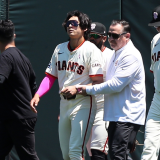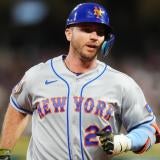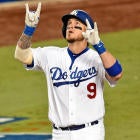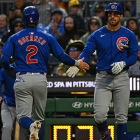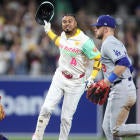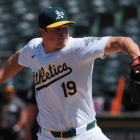LOS ANGELES -- "Get 'em on, get 'em over, get 'em in. That's good baseball!"
Newsflash, Small Ball honk: This isn't Little League. These pros can hit the long ball, and that's been the golden key offensively when it has come to winning games this postseason. On the flip-side, attempts at so-called small ball have actively harmed teams.
We just saw the Cubs throttle the Dodgers, 10-2, in Game 4 of the NLCS to even things up at two games. The Cubs hit two home runs (Addison Russell and Anthony Rizzo) while the Dodgers came up empty on that front. This is a common theme of the postseason.
To outline the point, let's go game by game and keep track of the record of the team with more home runs.
AL Wild Card Game:  5-2
5-2 
The Blue Jays homered two times to the Orioles' one, with the Edwin Encarnacion walk-off being the difference. Team Home Run is 1-0. Let's celebrate our first of many victories.
NL Wild Card Game:  3-0
3-0 
Conor Gillaspie's three-run shot was the difference. The previous inning the Giants bunted and ended up leaving the bases loaded. In the ninth, they didn't bunt and it ended up with Gillaspie's game-winner. 2-0 HR.
ALDS Game 1:  10-1
10-1
The Jays clubbed two long-balls to the Rangers' none. That's three in a row and plenty more coming ...
ALDS Game 2:  5-3
5-3
Toronto hit four homers in this one while the Rangers managed to scratch across three runs without the benefit of a homer. See how this works? Even the solo shots help you come out on top.
ALDS Game 3:  7-6
7-6
Holy smokes, it's a tie! Each team hit two home runs. Not surprisingly, the game went into extra innings. It ended on an error, so let's use this as the opportunity to stress that by no means does being anti-Small Ball mean that we're against fundamentals and playing good defense. Being anti-Small Ball means "Don't Bunt, Hit Dingers." That's it.
Team Hit Dingers is now 4-0-1.
ALDS Game 1:  5-4
5-4
Another tie, with each team clubbing three home runs. 4-0-2. If I were biased here, I might point out that the Indians took control of the game when they homered three times in four batters in the bottom of the third.
ALDS Game 2:  6-0
6-0
The Indians had one home run. Team Home Run is 5-0-2. Yes, we're still searching for that game where a team won by hitting fewer home runs because they were such a stellar Small Ball team. Will we even get one?
ALDS Game 3:  4-3
4-3
Not here, we won't. Coco Crisp's shot for the Tribe was the only homer of the game.

NLDS Game 1:  4-3
4-3
The Dodgers got Max Scherzer for two homers early and that would hold, while the Nationals didn't hit any over the wall.
NLDS Game 2:  5-2
5-2
Each side had one home run, but Jose Lobaton's three-run shot was the difference. Still, this is technically a tie, bringing Team Home Run to 7-0-3.
NLDS Game 3:  8-3
8-3
Nationals 8, Dodgers 3
The Dodgers got a pinch-hit homer from Carlos Ruiz, but the Nationals hit a pair of homers. 8-0-3.
NLDS Game 4:  6-5
6-5
Adrian Gonzalez's two-run homer was the only one of the game. 9-0-3.
NLDS Game 5:  4-3
4-3
Another tie, but let's discuss this one for a second. The Nationals seemed to be dominating this baseball game heading into the seventh inning. They only led 1-0, though, thanks to leaving too many runners on base. A timely home run would've made this a whole different ballgame. Instead, Joc Pederson's home run off Scherzer changed everything. Overall, we're 9-0-4 now.
NLDS Game 1:  1-0
1-0
Javier Baez's eighth-inning homer did the trick in this pitcher's duel. Here's another good example: Getting into about the fifth or sixth, this game had one of those "whoever hits a home run is going to win this one" feels. Do you, in the middle of a pitcher's duel, think, "whoever gets a walk, sac bunt, passed ball and sac fly is going to be the team that wins this one?" Be honest.
Oh and we're 10-0-4.
NLDS Game 2:  5-2
5-2
Sure, it was a pitcher (Travis Wood), but Team HR is strong. That Wood dong was the only one in the game. It's 11-0-4, and I really wonder if we'll ever find a game where the winning team lost out in the homer game ...
NLDS Game 3:  6-5
6-5
And here it is. It's one of those games that gets people going. The Cubs' five runs came on two homers (Jake Arrieta's three-run shot and Kris Bryant's two-run job). Meanwhile, the Giants scratched and clawed their way to six runs on 13 hits. There were three doubles and two triples, but nary a hit left the yard for the winning team.
So afterward I'm sure we could hear from almost anyone that the Cubs were "too reliant" on the home run and the Giants did "all the little things" to win.
The problem is this was a complete outlier against the rest of the postseason. Team Small Ball is now 1-11-4 -- and we should also point out that every scoring opportunity for the Giants resulted from either a double or a triple and not a bunt.
So enjoy your technicality, Team Small Ball. You're gonna need it ...
NLDS Game 4:  6-5
6-5
It wasn't why they won, but the only home run of the game came off the bat of Cubs catcher David Ross. Then again, if he doesn't hit it, maybe the comeback in the ninth doesn't happen. Also of note, the first out the Giants recorded in the ninth was a sac bunt, which followed a single, walk, double and single.
Oh yeah, and we're 12-1-4, Team Smart/Non-Stubborn People.
ALCS Game 1:  2-0
2-0
Francisco Lindor homered and that was good enough to help propel the Indians to victory.

More importantly, Team Home Run is now 13-1-4.
ALCS Game 2:  2-1
2-1
The only home run of the game came off the bat of Carlos Santana, pushing team Small Ball into "throw the damn towel!" territory at 1-14-4.
ALCS Game 3:  4-2
4-2
Longballs from Mike Napoli and Jason Kipnis bettered the Michael Saunders shot. This is a bloodbath.
ALCS Game 4:  5-1
5-1
We getting the picture yet? If not, Josh Donaldson makes us 16-1-4.
ALCS Game 5:  3-0
3-0
Two more Indians home runs and the Blue Jays were shut out. That runs our rally to 17-1-4.
NLCS Game 1:  8-4
8-4
Miguel Montero's grand slam was the big blow in the game.
Dexter Fowler added a shot immediately thereafter while the Dodgers only got one home run. 18-1-4.
NLCS Game 2:  1-0
1-0
Adrian Gonzalez's home run was the only run of the game. 19-1-4.
NLCS Game 3:  6-0
6-0
While the Cubs' offensive woes continued to fester, the Dodgers hit two home runs. Team Home Run is 20-1-4.
And, of course, we have the Cubs winning Game 4, as noted in the intro above. So it's 21-1-4.
The team that hits more home runs than the other team is 21-1 this postseason, with four games having the teams even in homers.
I'm sure that's just a huge coincidence and teams are better suited to "get 'em on, get 'em over, get 'em in," though, right?
C'mon. Get real.
While it's true that I've been having fun and using snark, there is a real reason the home runs have been such a tipping point this postseason. It's because we're seeing, for the most part, well-pitched games along with close games. Given that a home run is a maximum output event and easily the most efficient way to score, it's obvious that games will turn on home runs. When the pitchers are in total control of a game (think about the two 1-0 games listed above), teams aren't going to be able to string together four or five hits, maybe not even three.
Those against bunts focus on this, insisting that you only get 27 precious outs in a game and giving several of those away for free -- generally speaking, of course, as sometimes a bunt makes sense -- is pretty folly.
You want your favorite team to win the World Series? Hope they hit a lot of home runs. That's much more efficient than wasting outs on bunts.







